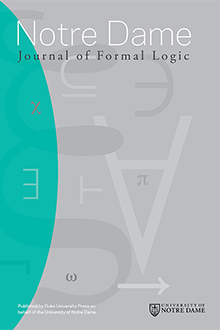Abstract
The neo-Fregean program in the philosophy of mathematics seeks a foundation for a substantial part of mathematics in abstraction principles—for example, Hume's Principle: The number of $F$s $=$ the number of $G$s iff the $F$s and $G$s correspond one-one—which can be regarded as implicitly definitional of fundamental mathematical concepts—for example, cardinal number. This paper considers what kind of abstraction principle might serve as the basis for a neo-Fregean set theory. Following a brief review of the main difficulties confronting the most widely discussed proposal to date—replacing Frege's inconsistent Basic Law V by Boolos's New V which restricts concepts whose extensions obey the principle of extensionality to those which are small in the sense of being smaller than the universe—the paper canvasses an alternative way of implementing the limitation of size idea and explores the kind of restrictions which would be required for it to avoid collapse.
Citation
Bob Hale. "Abstraction and Set Theory." Notre Dame J. Formal Logic 41 (4) 379 - 398, 2000. https://doi.org/10.1305/ndjfl/1038336882
Information





